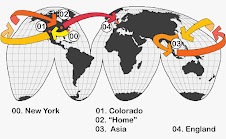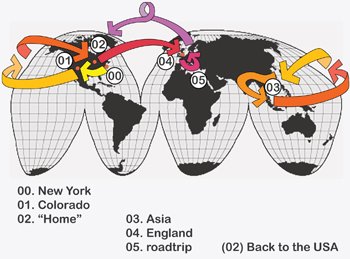When Josh and I first heard a two-sentence bit on NPR mentioning some protests in Myanmar (Burma) last week, we both felt a flutter of excitement, hope, and dread. Most Americans, it seems, didn't feel much of anything. I've been wanting to write about that news story since we first heard it, but ran out of time with all the packing and family/friend-visiting. Now that the story keeps growing (it was on the front page of the NY Times we bought this morning), I feel as though I have to say something!
Please read the rest...
My first thoughts last week were to wonder how many other small news stories I'd ignored through the years. This one meant something to us because we had been to the places mentioned and maybe even met some of the people involved. Honestly, though, I had never really heard of Burma (much less Myanmar) until last year when Josh attended a lecture on genacide at Columbia. I didn't realize when he told me the Burmese government had some of the worst human rights violations in the world that we would be visiting the country the very next year.
When we were considering visiting the country, we read a number of articles/books/opinions about whether visiting Myanmar was bringing our economic support more to the impoverished people or the oppressive governement. We decided the former, and I am glad that we did. If we hadn't, the news story that many of my friends barely "heard" would have made little impression on me, either. Now, I am aware of an amazing people, an amazing country, an amazing landscape, all of which are in dire need of change, and I grow more and more excited as the story makes more and more press.
That being said, we are not excited that the growing news is mostly because the government has turned violently against the peaceful protesters. Of course, the initial thrill last week of hearing that the people were actually speaking out was immediately followed by a sense of dread, knowing the peaceful protesting simply could not last in that environment, so we feared this would be the inevitable result. The last time an uprising of this size occured was about two decades ago and ended in killings, beatings, arrests, and the continuation, as before, of an oppressive military regime. And the country fell out of the news once again.
Obviously, we are no Burmese experts. What we have gleaned from various sources is that the government spends 40% of the country's budget on the military- for the simple reason that if they don't keep the military strong, the people will uprise. We heard that gas prices were constantly on the rise and recently grew by 300%, while cooking oil went up by 500%. This price increase was only barely related to an increase in product costs, and added to the already difficult lives of the people. Already, simple things we take for granted, like new phone lines or license plates, must be bought on the black (grey) market because the government no longer issues them, knowing more money can be made selling them illegally. Thus, the new increases were the last straw, so to speak, and caused Buddhist monks in the capitol and other cities to start marching in protest.
More examples of the opressive regime? A few years ago, while most of the country's people were living in poverty, the marriage of an army official's daughter brought in millions of dollars of wedding gifts. A while back, the government suddenly decided to devalue the country's currency and any savings the people had been able to acquire were gone. There are now no foreign banks whatsoever, no atms, few retirement funds. We read not to use the railroad or visit some newer tourist attractions because they were built by forced labor, minority people who were forcefully moved out of their villages and, if not killed, made to work on government projects. We met a family who had moved to Inle Lake after being forced out of their village, Bagan, where their family had lived in for centuries. The ruins of Bagan were considered the country's best tourist attraction (rightfully so), so the government suddenly decided to clear the village of people. In Myanmar, we had trouble accessing certain websites, even gmail and yahoo, that were restricted by a government trying to keep the people contained. We were also instructed not to speak about politics with the people we met because one could never be sure that an eavesdropper wouldn't turn them in and cause an arrest after we left.
So you can understand our excitement when we heard that the monks were peacefully protesting. It's not like the random protests that happen weekly on the streets of the city we are in right now- New York. No, this was a real event. This was something exciting and dangerous and possibly life-changing for thousands of people. But we were also worried because we knew the government wouldn't stand for it for long. And, honestly, we aren't sure how optimistic to be. You can probably read more informed opinions elsewhere. I don't completely understand the intricacies of American politics, much less those involving world sanctions and military governments. But I do know the people don't deserve the government they have. I know that almost every male Burmese citizen becomes a monk twice in his life, once as a child and once as an adult, so all those men being fired at, arrested or killed, are sons, fathers, friends of other sons, fathers, and friends... and mothers, daughters... But the government is too powerful. I don't see how they can possibly be overthrown and if sanctions that have been in existence for a decade haven't made a difference in the past, why would they now? Unless an army whose livilihood is determined by its bosses staying in power decides to switch sides and mutiny, I don't see how the government can be overthrown. Until China and India step up and stop "helping", I don't see how the government can change.
I just hope this time isn't like last, that instead the protests, the news coverage, the beatings, make a difference. At the risk of romanticizing, let me say that Burma/Myanmar is an amazing country with some amazing people and amazing sights. As the government begins to shut down internet cafes, limit cell phone networks, and the news is harder to find, I hope we don't all forget this country. I don't know personally what I can do about it, what you can do about it, but I would like to think that the world's news means something more to me now.
Friday, September 28, 2007
The news- myanmar
Posted by
Anonymous
at
6:16 PM
![]()
Subscribe to:
Post Comments (Atom)


1 comment:
I appreciate your thoughts, Megan. Milli and I join you in hesitant hopefulness that this may lead to something better for the Burmese people.
Post a Comment